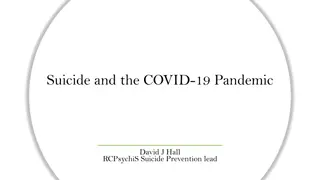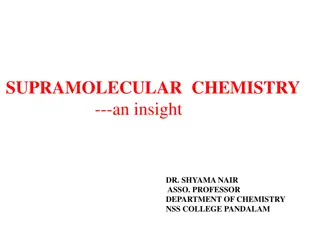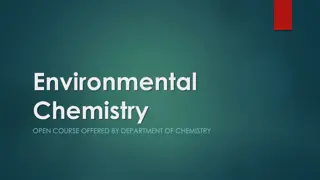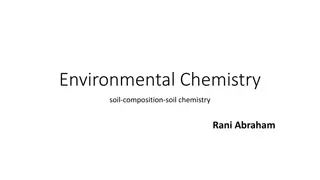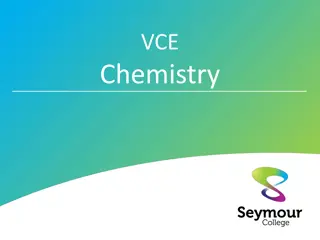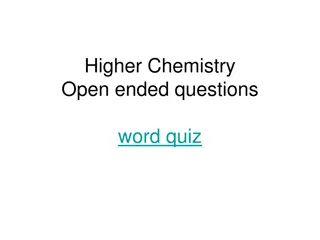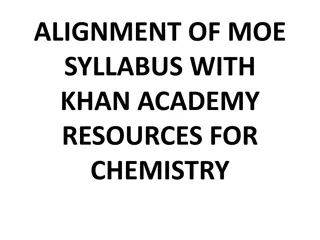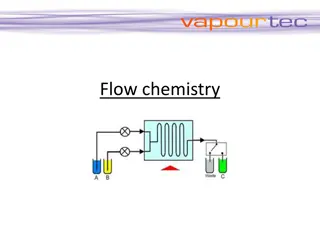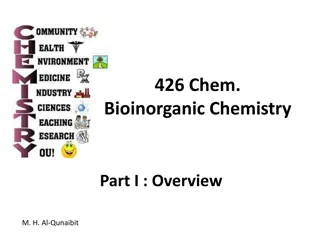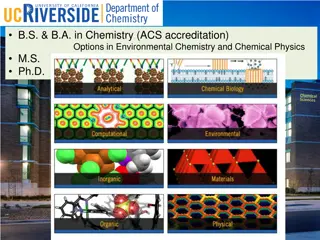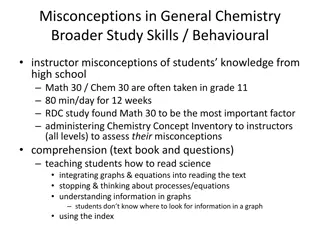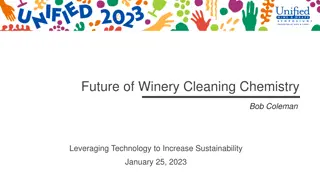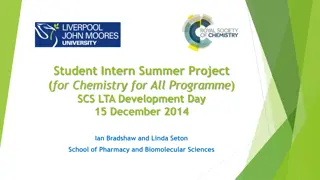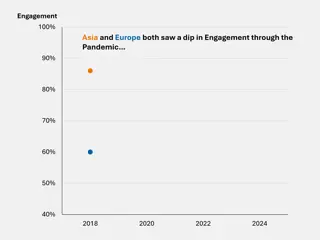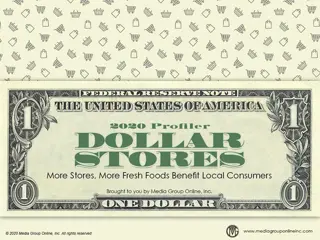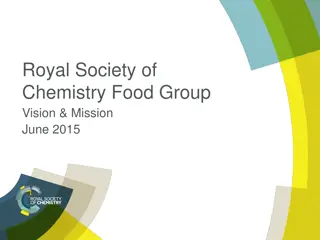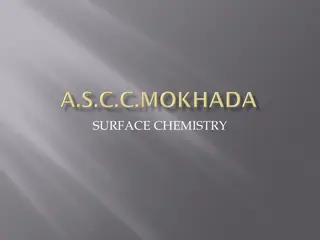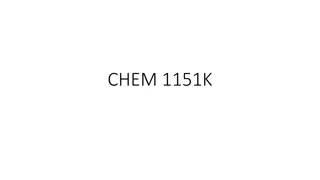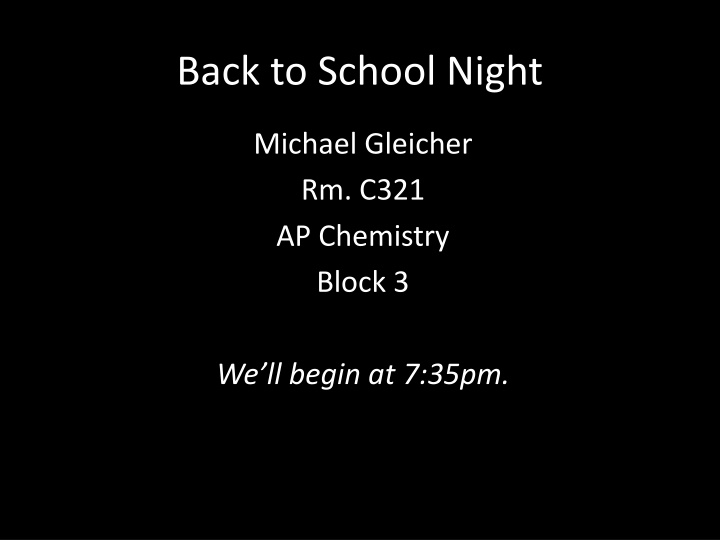
AP Chemistry Course Overview and Teaching Philosophy
Explore an in-depth overview of the AP Chemistry course including major units, teaching philosophy emphasizing student responsibility, and resources for success. Learn how the course mirrors college-level dynamics and the approach to each unit's three-phase structure.
Download Presentation

Please find below an Image/Link to download the presentation.
The content on the website is provided AS IS for your information and personal use only. It may not be sold, licensed, or shared on other websites without obtaining consent from the author. If you encounter any issues during the download, it is possible that the publisher has removed the file from their server.
You are allowed to download the files provided on this website for personal or commercial use, subject to the condition that they are used lawfully. All files are the property of their respective owners.
The content on the website is provided AS IS for your information and personal use only. It may not be sold, licensed, or shared on other websites without obtaining consent from the author.
E N D
Presentation Transcript
Back to School Night Michael Gleicher Rm. C321 AP Chemistry Block 3 We ll begin at 7:35pm.
Contact Info mgleicher@cbsd.org I will return e-mails within one work day. (267) 893-3000 x6099 Please e-mail first. Canvas
My Schedule Block 1: AP Biology Block 3: AP Chemistry Block 4: AP Chemistry
Extra-Curricular ACS ChemClub Co-Advisor with Mr. Choi at CB South H.S. Partnership with Airgas Once-a-month meetings on Thursdays The fun side of science!
About the course The most important thing to remember is that this course is at the college-level and often seeks to mimic the same dynamics. A great deal of the learning responsibility is necessarily shifted to students for reinforcement. The course runs all four marking periods, culminating in a final exam (and a midterm), with the AP Exam in early May. Many colleges/universities accept AP Chemistry Exam scores of 3, 4, or 5 (out of 5) as college credit.
The Teaching Philosophy AP Chemistry also will be taught using a repeating three-phase structure for each of our ten units. Phase 1: Introduction and Look-Ahead You ll be asked to complete selected problems at home and independently, even if I haven t taught you how to solve them yet. There are examples in the book that you can follow. Phase 2: Standard Teaching and Labs This is probably what you re most expecting. You ll learn how to do the problems from Phase 1, except things will go faster since you re already somewhat familiar with them. Phase 3: Test Preparation Shortly before the unit exam, we ll review and practice.
About the course Major Units Core Course 1. Atomic Structure and Measurement 2. Chemical Reactions 3. Ionic and Molecular Compounds 4. Intermolecular Forces, Gases, and Spectroscopy 5. Thermochemistry 6. Kinetics 7. Equilibrium 8. Acids and Bases 9. Thermodynamics and Electrochemistry 10. Nuclear and Organic Chemistry Materials Scientific or graphing calculator Class notebook (ideally a binder) Lab notebook
About the course In Class/At Home: Suggested reading Practice problems Online Resources: All notes Canvas activities Practice exams Worksheets (some including answer keys) Study guides Extra Help: Me (before/after school or e-mail) (Phase 1)
Textbook and Student Guide Chemistry: The Central Science Pearson 13thedition http://www-fp.pearsonhighered.com/assets/hip/images/bigcovers/0321775651.jpg
Grading Consistent grading across department. Grades posted rapidly: Summative (90%) Tests and quizzes, labs, projects Formative (10%) Classwork Most homework Practice (Non-Graded) Phase 1 Problems
Grading Consistent grading across district. Marking Period 1 20% Marking Period 2 20% Midterm 10% Marking Period 3 20% Marking Period 4 20% Final Exam 10%
The Big Takeaways College-level Fast-paced. Lots of responsibilities necessarily shifted onto students. Students have to choose to put in the work ahead of time.
AP Exam The AP Exam is Friday, May 7, 2021, at 8 AM.* *Details, including the date, are TBD. The AP Exam costs $100. Most colleges/universities accept a score of a 4 or 5 and will award credit on that basis. As an example, recently, Syracuse awarded 8 credits for a 4 on the exam. If tuition is $40,000 for a total of 30 credits, that s an approximate value of $10,666 for those 8 awarded credits. Registration will be open until February 28, 2021. Taking the exam? Pay for it via MyPaymentsPlus. If you re not taking the exam, no action is necessary.
AP Chemistry Score Distribution 2011 - 2020 100% 5 5 5 5 5 5 5 90% 5 5 5 4 80% 4 4 4 4 4 4 4 4 70% 4 60% 3 3 3 3 3 3 3 3 3 50% 3 40% 2 2 2 2 2 2 2 2 30% 2 2 20% 1 1 10% 1 1 1 1 1 1 1 1 0% 2011 2012 2013 2014 2015 2016 2017 2018 2019 2020
Exam Prep and Review Review sessions will occur in class in the time leading up to the exam. Separately, we recommend two particular review texts: 5 Steps to a 5 Moore & Langley Cracking the AP Chemistry Exam The Princeton Review



